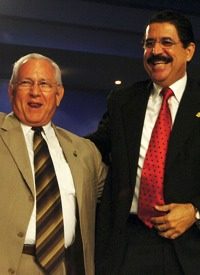
ABC News reported that Zelaya’s arrest and exile occurred "just hours before a rogue referendum he had called in defiance of the courts and Congress, and which his opponents said was an attempt to remain in power after his term ends January 27."
A VOA news report observed that "Zelaya was going ahead with the referendum in defiance of the Honduran Supreme Court, which declared the vote illegal. The Honduran military had refused to help organize the balloting. The president fired the armed forces chief of staff, General Romeo Vasquez, last week for failing to support him."
Zelaya was described by the New York Times as "a leftist aligned with President Hugo Chávez of Venezuela." The newspaper also summarized the power struggle as "the culmination of a battle that had been simmering for weeks over a referendum, which was to have taken place [on June 28], that [Zelaya] hoped would lead to a revision of the Constitution. Critics said it was part of an illegal attempt by Mr. Zelaya to defy the Constitution’s limit of a single four-year term for the president."
The report continued: "Early this month, the Supreme Court agreed, declaring the referendum unconstitutional, and Congress followed suit last week."
Later that day, the Honduran Congress voted to replace Zelaya with the president of the congress (akin to the U.S. Speaker of the House), Roberto Micheletti. Micheletti announced that he will only serve until the end of Zelaya’s term in January. Presidential elections are scheduled for November. "We respect everybody and we only ask that they respect us and leave us in peace because the country is headed toward free and transparent general elections in November," said Micheletti. He also announced that Zelaya would be welcome to return to Honduras as a private citizen on one condition: "Without the support of Mr. Hugo Chavez, we would be happy to take him back with open arms."
Micheletti was adamant that he had not attained the presidency "under the aegis of a coup d’etat," insisting: "I have reached the presidency as the result of an absolutely legal transition process." He also defended the military’s role in the power transition, saying, "The armed forces have complied with the constitution and the laws."
The new president’s designated foreign minister, Enrique Ortez Colindres (former ambassador to the United Nations and France) concurrd and told HRN radio in Tegucigalpa, the nation’s capital, on June 29 that no coup had occurred. Colindres said the military had merely upheld the constitution "that the earlier government wanted to reform without any basis and in an illegal way."
Micheletti is a member of the Liberal Party of Honduras — the same as Zelaya.
Among the strongest critics of the power transition in Honduras was Venezuela’s Marxist dictator Hugo Chavez, who, speaking from Managua, Nicaragua’s capital, issued a call for armed resistance to Micheletti: "If the oligarchies break the rules of the game as they have done, the people have the right to resistance and combat, and we are with them."
An AP report quoted Micheletti as saying the army acted on orders from the courts, and that the ouster was carried out "to defend respect for the law and the principles of democracy." Micheletti also responded to Chavez’s statements, saying "nobody, not Barack Obama and much less Hugo Chavez, has any right to threaten this country."
Shortly after arriving in Costa Rica, Zelaya traveled to Managua on a plane provided by Chavez to attend a "super summit" of regional meetings of Central American leaders. Among the groups represented at the summit is Chavez’ leftist alliance of nations, known as ALBA.
A statement posted on the White House website on June 28 said that President Barack Obama was "deeply concerned" by Zelaya’s expulsion:
I am deeply concerned by reports coming out of Honduras regarding the detention and expulsion of President Mel Zelaya. As the Organization of American States did on Friday, I call on all political and social actors in Honduras to respect democratic norms, the rule of law and the tenets of the Inter-American Democratic Charter. Any existing tensions and disputes must be resolved peacefully through dialogue free from any outside interference.
The Inter-American Democratic Charter is an instrument of the Organization of American States (OAS) that "spells out what democracy entails and specifies how it should be defended when it is under threat" Under the Charter, the OAS has the power to censure member states that violate its definitions of democracy, up to and including expulsion from the regional organization. The General Assembly of the OAS is scheduled to meet in a special session on June 30 to discuss the situation.
Secretary of State Hillary Rodham Clinton said the United States was working for "full restoration of democratic order in Honduras."
While practically all of the world’s media has referred to the change in power in Honduras as a coup, the nation’s own governmental institutions, including its supreme court and congress, insist that the removal of Zelaya was done in accordance with the nation’s constitution. Absent any Rwanda-style atrocities or genocide, it seems that the rest of the world’s nations should have no interest in how Hondurans settle their political differences.
Imagine if an international body had objected to the U.S. Supreme Court’s intervention into the disputed recount process in Florida after our 2000 presidential election! It is hoped that we would have told that body to mind its own business.
Hondurans can effectively tell the rest of the world the same, but as a tiny country, they are much more vulnerable to outside pressures than is the United States. One wonders if Zelaya had been an adversary of Hugo Chavez, instead of an ally, if his removal would have generated so many objections from Chavez’ cheering section.
Photo: AP Images



